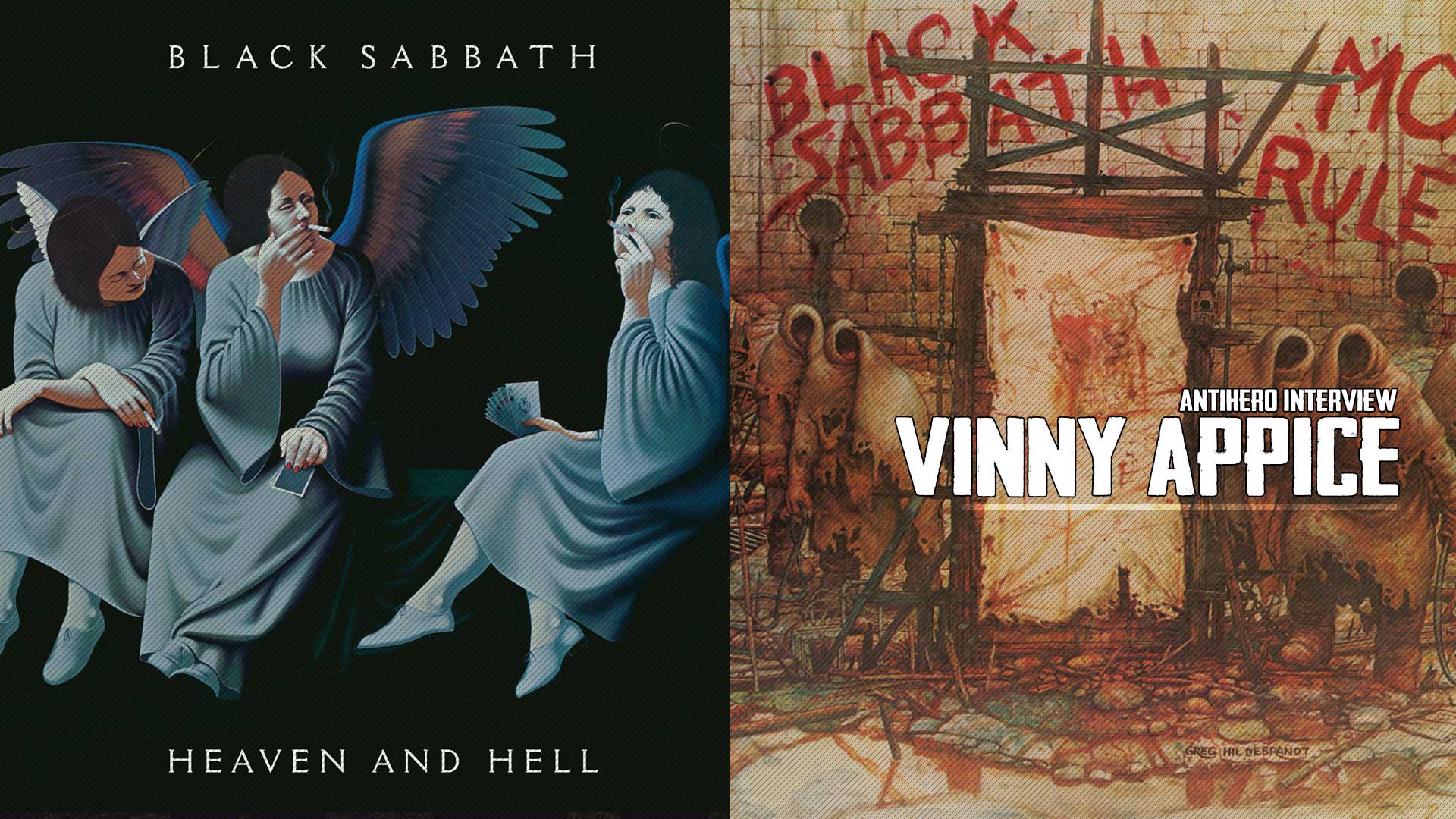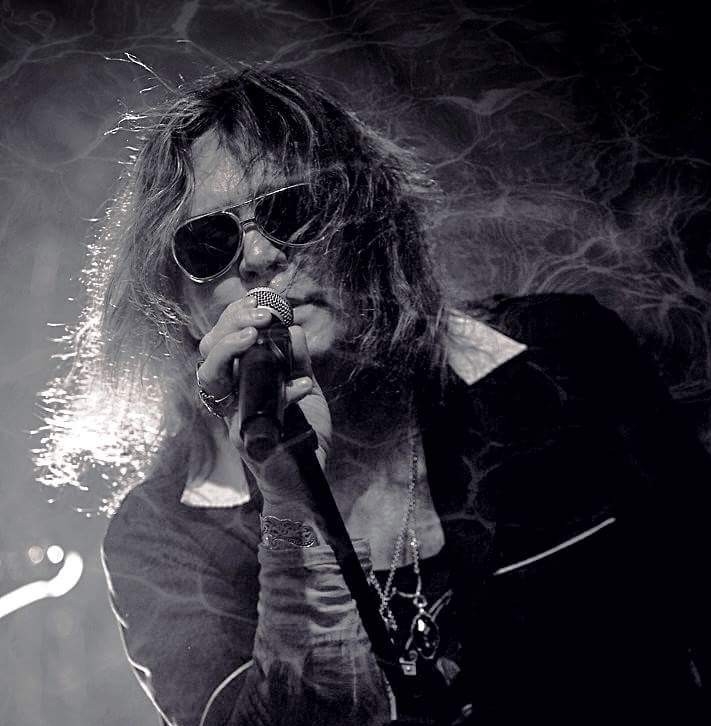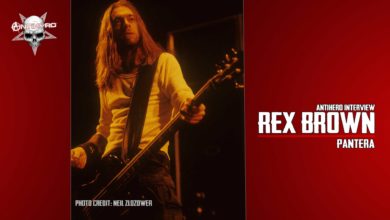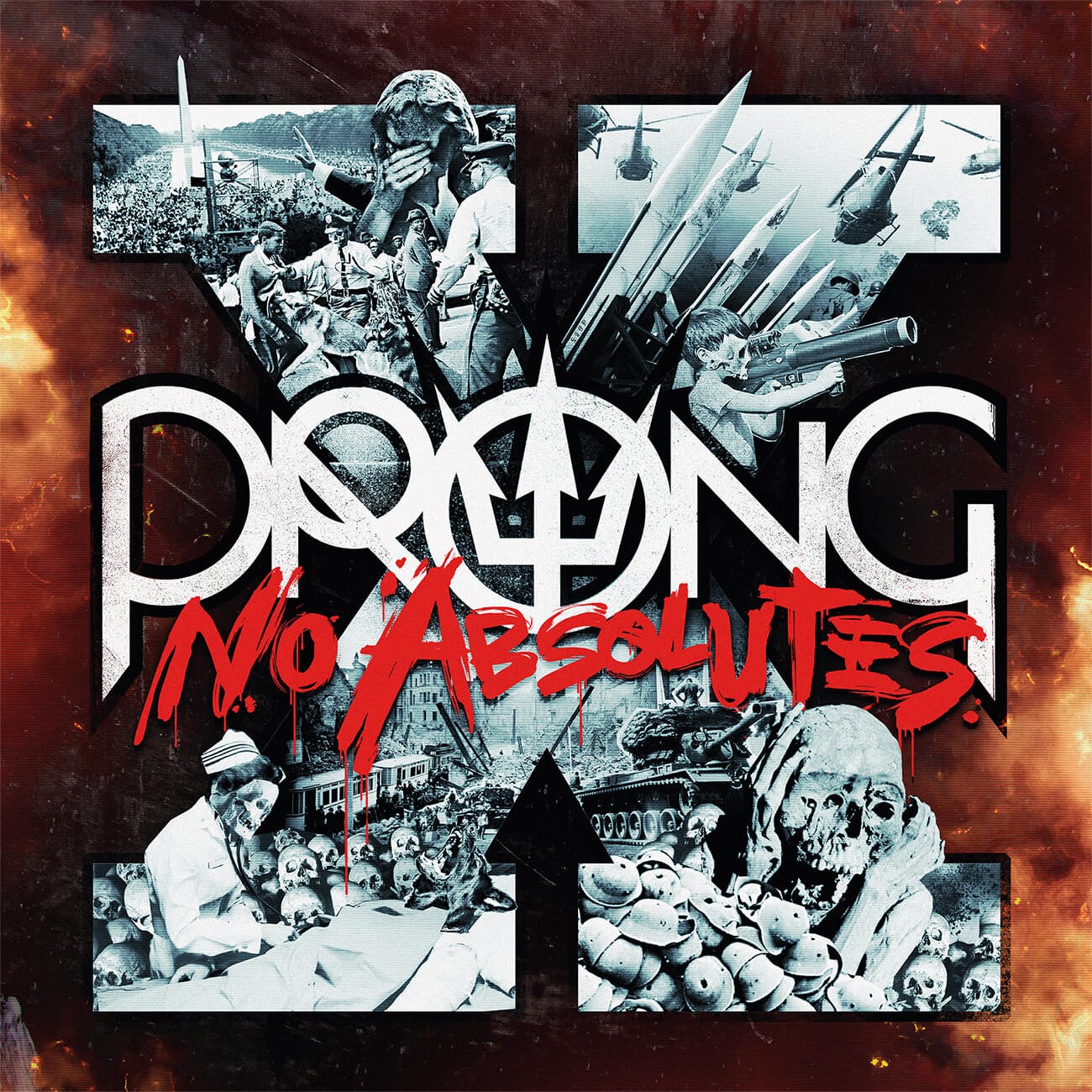Singer Ronnie James Dio joined Black Sabbath in 1979 which resulted in two back-to-back classic albums: “Heaven and Hell” and “Mob Rules”. On those memorable albums, Dio’s soaring tenor and gothic songwriting were the perfect foil for the band’s bone-crushing mix of razor-sharp riffs, intense grooves, and dark imagery.
Rhino salutes the long shadow cast by this short-lived lineup with newly remastered versions of both albums expanded with rare and unreleased music. HEAVEN AND HELL: DELUXE EDITION and MOB RULES: DELUXE EDITION will be released separately on March 5. Each album will be available on 2-CDs ($19.98), or 2-LPs ($31.98). Due to space constraints, both vinyl editions include a selection of bonus material from the CDs. The music will also be available via digital download and streaming services on the same day. A rare live version of “Heaven and Hell” and a previously unreleased live version of “The Mob Rules” are both available today as digital singles.
I recently had the opportunity to chat with legendary drummer Vinny Appice who played on the “Heaven and Hell” album tour and played on its follow-up “Mob Rules”.
ANTIHERO: it’s been a crazy time for the world in the past year, how have you been getting through?
Vinny Appice: Well, luckily, I’m doing a lot of stuff online. I got a drum show every Tuesday at 4:00 p.m. on Facebook, sponsored by my drum company, and it’s an hour-long thing. I play music; I teach a little bit. That’s been keeping me busy, and I do a lot of sessions here, and that’s been keeping me busy. And then Last in Line, we’re working on the third album. So right now, we’ve got half of it done, and now we’re just sending ideas back and forth. We need to be in the same room together to finish. It’s that kind of band. So, I’ve been busy.
ANTIHERO: Rhino Records have re-released the Black Sabbath albums, “Heaven and Hell” and “Mob Rules”. Did you get sent those or have you heard the new versions?
Vinny Appice: Actually, I just got a couple of copies of those on Saturday, but I haven’t had time to listen to it. Let’s see what it sounds like compared to the old, mastered versions. But it looks nice, it looks really, really cool. And there’s a couple of extra tracks, a couple of live tracks, I believe, on the Mob Rules that I’m on.
ANTIHERO: Of course, you didn’t actually play on the “Heaven and Hell” album, but you obviously played the songs live. I just wondered, what was your introduction to the “Heaven and Hell” album? Had you heard it before you joined?
Vinny Appice: That’s a good question because I actually didn’t hear it before. The only song I heard before was “Neon Knights” from the album. I think it was out for a bit. I wasn’t following it, but I heard “Neon Knights” on the radio, and I listened to it. I was in the car driving and I thought, “Wow, that sounds great.” But then, I wasn’t even aware of Ronnie so much. “Wow, that new singer sounds really good, man. Wow.” I didn’t really follow Ronnie. I heard Rainbow a little bit but wasn’t following his career closely. But when I heard “Neon Knights”, I went, “Oh man, that sounds great. They got a new singer. The band sounds revitalized.” And then about two weeks later, that’s when I got a phone call to come down and play. So luckily, I heard that song. That’s the first song we played together.
ANTIHERO: What about, then, the album as a whole? Was it a case of you actually have to go and get a copy, learn the tracks?
Vinny Appice: You know what? I can’t remember how I got a copy, but I think the office might… I don’t know, that’s a good question. We only had four days to rehearse, so I had to learn all these songs. So, I think Jeff Nichols, when I went down to play with them, Jeff Nichols, the keyboard player, must have given me all the songs on a tape of the set. And back then it was the Walkman, and I listened to everything on the Walkman. The first day, we played “Neon Knights”, worked it up a little bit, and then maybe a song or two, and then the band wanted to go to the pub. So, everybody went to the pub except me and Jeff, the keyboard player. We stayed back and worked on the songs together. So, the first two days were like, “Going to the pub.”
ANTIHERO: Of course, then with the follow-up album, you’re already part of the band from having toured with them. Was that easier going into the studio with Sabbath having done the “Heaven and Hell” tour?
Vinny Appice: Oh yeah. Yeah. We got to know each other a lot better, musically and personally. And during the “Heaven and Hell” tour, Warner Bros asked us to do a song for the movie Heavy Metal. We were in England touring and we went into John Lennon’s house, but it was owned by Ringo now, because John passed, unfortunately. So, we went in there and we stayed there for two nights, and we wrote and recorded the Mob Rules there. It was a great house, a big mansion. We had the drums down below the staircase. It was cool, it was a great, great time. Once we finished it, everybody was really excited about it. Sounded great. And then played for Warner Bros, they loved it. So that cemented me in the band. Because when I first joined, they thought Bill was going to come back. It was like, “Well, yeah, you’re in the band, unless Bill comes back.” He’s the original drummer. But Bill never came back, so I was in the band. And then we recorded the “Mob Rules” song, which really cemented me into the band.
ANTIHERO: What input did you have to “Mob Rules”? Obviously, you were the new guy. Were the band receptive to listen to your ideas, your creative input to the songs, or were they already kind of formulated?
Vinny Appice: No. Everybody was open to ideas. The thing is, with Sabbath, and Dio, actually, we never went into the recording studio, I mean, into the rehearsal studio, with songs. We wrote them together. We jammed a lot. I just kept the tapes going. We had a cassette recorder, two mics, and I kept track of all the tapes. When there was a good riff happening, I’d record it, when somebody wanted something recorded, we put everything down on tape. And I was in charge of that. And they were open if they had an idea or two. I didn’t really go over the top, because I just joined the band, and I think they know what they’re doing. So, we’d work that way. And then, if I made a suggestion, we’d try it. If we liked it, we used it, if not, we moved on. But it was a good working relationship. It was great.
ANTIHERO: Yeah. What about that connection with Ronnie? Obviously, you went on to work extensively with Ronnie James Dio. Was he a difficult person to get to know, or did you two just connect right away?
Vinny Appice: Yeah. Yeah. When I met Ronnie that day. We were in that noisy car. Okay. Ronnie and I connected right away because we’re both from New York. He’s from upstate, I’m from Brooklyn. We’re both Italian. He’s older than me. He’s 15 years older than me, but we just hit it off really well. With Tony and Geezer, we hit it off, but I found it hard to understand their Birmingham accent. Because I was not around a lot of British people, especially from Birmingham. At that time, I was very young, I was 22 years old. So, I used to ask Ronnie, I said, “Tony and Geezer said…,” I said, “what did they say?” So, we hit it off, eventually, also. It was like we all got along great.
ANTIHERO: And obviously, as I say, you went on to have quite a career with Ronnie Dio, as well. Couple of different times over the years?
Vinny Appice: Yeah, yeah. Couple times. The first time was after the album Live Evil came out, things were bumpy between the three guys. Not me, I’m the new guy on the block. Things were quite bumpy, and then eventually, Ronnie said he’s going to leave the band and he’s going to start his own band; do I want to join with him? And I said, “Wow, how exciting. That’d be great.” And at the same time, I could’ve stayed with Tony and Geezer, but I just thought it would be easier to work with Ronnie. We’re both in California, Tony and Geezer lived in England. So, it was a hard choice. And I decided, okay, let’s do it. This will be exciting. A brand-new band with one of the greatest vocalists in rock. So that’s what happened. And then we just happened to get some great players. We got Jimmy Bain, who recommended Vivian Campbell. Once we got that together, the band played so well together. It’s on fire. Same with Sabbath, too. Just a great combination, good players.
ANTIHERO: I was going to ask, obviously, you’ve done many musical bands, projects in your career. How do you view that time to Sabbath? Is it just another band that you work with, or is there a particular fondness for that period?
Vinny Appice: Nah. Sabbath, well, it’s so legendary. That’s like a whole learning experience, going on tour and playing with Tony, Geezer, and Ronnie. I learned so much stuff and playing big places. Everybody’s so pro. So, I kept my eyes open and picked up a lot of things from them. No, that was absolutely special. It’s such a legendary band. It’s even more legendary now than it was when I was playing with them. Now it’s like, “Oh my God, Black Sabbath.” Legend, because it’s long enough, I guess. Yeah, that was just amazing… I was lucky to get to play in that band at that time, and then move on with Ronnie at the same time. Legendary Ronnie, legendary Dio.
ANTIHERO: You obviously had big shoes to fill in that you were going in. Bill Ward was the original Sabbath drummer, and you were coming in. Did you feel any weight of pressure going in after Bill left?
Vinny Appice: Oh yeah. And the pressure was due because we only have four days to rehearse. I had to learn 13, 14 songs. A lot of the old Sabbath stuff changes tempos, it does a lot of different things, so I had to really listen. And then I had to play what Bill played. So, I played a lot of those important parts that Bill played, but then I put myself into it, too, the way I would play some of the grooves. I’m a different drummer than Bill. Bill’s an amazing drummer, and the parts he created were amazing. So, I did what was called for, and then put my personality in there as well, unless somebody said, “Oh, you need to play this part like Bill.” Once in a blue moon did somebody mention something. It was a learning experience.
And then as the tour went on, it got easier. I didn’t have to keep listening and listening and listening. Got the headphones on, listening to the songs, and making cheat sheets and charts and stuff. But as the tour went on, after a couple of weeks, I’m pretty much locked into it. And then we even play better together, because I know how they play. I learned a lot about how Tony and Geezer play, which is more on the laid-back and heavy. So that taught me a lot. And then Ronnie singing over it, just incredible.
ANTIHERO: Obviously, you played on the “Mob Rules”, you played on “Holy Diver”. Those albums have become iconic, classic albums. Did you feel at the time anything special about those albums, or did it only come to light in later years when those albums were held up in such high esteem?
Vinny Appice: Yeah. I mean, I knew they were good. We did “Mob Rules”, I went, “Oh that sounds really cool.” Really heavy, good, good Sabbath album. Didn’t think about trying to make a legendary album or if this was going to be a legendary album, part of rock history. You never go in thinking like that. You just go and do what you feel, and you do your best with that and how the band’s creating together. And same with “Holy Diver”, we were having so much fun making that record. We rehearsed and recorded at Sound City. Dave Grohl did his documentary. That was a crazy place that we worked at. And we just used to go in at 7:00 every night and smoke a lot of pot. We had some drinks, and we would just party a little bit, and then write and concentrate. We were just having a great time. It was like the boys club at night. It’s really cool. And that makes good music because when the band doesn’t like each other, somebody doesn’t like each other, there’s friction. That’s not good, not good for the music.
ANTIHERO: Obviously, Last in Line started off, you had the opportunity to revisit those early Dio albums. Do you view them differently when you come to look back at them?
Vinny Appice: Well, the funny thing was, we just started as a jam. Vivian called me and said that he spoke to Jimmy Bain, am I up for a jam, because everybody was in town. I said, yeah. So, the three of us got together. We didn’t listen to the songs, really. Let’s play Holy Diver and see what happens. And we’d mess it up and start over and have a laugh. Vivian’s trying to remember the solos and all that stuff. And that’s the way we did it. And we just had a great couple of hours at a rehearsal place, having a good time. Then we decided to do it the following week, and my friend, Andy Friedman was in town. I said, “Hey dude, you know some Dio stuff, right?” “Yeah, yeah.” “Can you come down and sing?” He said, “Sure.” And then when we heard him sing that stuff, we were blown away, like “Holy shit, sounds great.” So, we decided maybe we should do some gigs. And our managers, Steve Strange booked a whole bunch of gigs, about five or six gigs in Europe. So, we went over, and we played Europe and the response was incredible. We played at one or two shows out in California first, and we’ve got such a great response. I’m sitting there playing, go, “Man, these songs are 35 years old. People are still screaming and yelling and jumping.” Said, “This is amazing.” It was great to revisit all the old stuff. And the first tour, we just did basically all old Dio stuff. We didn’t have our own album out. It was fun.
ANTIHERO: Which do you enjoy better, being a part of a band like Sabbath or Last in Line, or being your own boss where you’re able to experiment and work with different musicians?
Vinny Appice: I like doing both. Obviously, if we were doing Sabbath, that would be more than enough musical content in my life. And just to be part of that legendary band is very fulfilling. These days, a lot of people multitask. So, I do a lot of different things now and I enjoy it. I even go out and play. I played about 25 shows in Europe with this great Italian band. We did all the old Sabbath. Actually, we did most of the stuff from Mob Rules and a couple of Dio songs I’m on, and a couple of old Sabbath songs. And I did three tours and people love it. I did a couple here in the States. So, I like doing that, too, because it’s fun. It’s not so much pressure. I’m the guy, the other guys are unknown, let’s go, let’s kick-ass, and the band was great. And I did it in South America. So, I’m enjoying doing all these different things.
ANTIHERO: Yeah. Obviously, you’re primarily known as a heavy rock drummer. Most of your bands have been in that musical style. Have you ever yearned to maybe play something different that would surprise people? That being, different musical styles, genres, that you haven’t yet done, something that interests you?
Vinny Appice: No. No.
ANTIHERO: No?
Vinny Appice: No. I like playing heavy. I like playing music too. So, I do a lot of sessions here in my studio for some different projects, and some of them are a little lighter. And I’ll listen to it and get into the song, create parts and blah, blah, blah. I like doing that, but I like to stay on the heavier side. I’ve spent so many years building up power. I play loud, but I play music and dynamics. I come down, and then I’m not one of these guys that are all at one level. But my main thing is I really love the heavy stuff, heavy rock.
ANTIHERO: Do you keep in touch with current musical trends, new bands, or do you find that you don’t bother?
Vinny Appice: A little bit. I go on YouTube and listen, check out some things that are happening and stuff. But not that much. I can’t tell you some of the names off the top of my head, but there are so many bands now out there that you could listen to. With the internet, more than anything ever before.
ANTIHERO: Do you find it’s easier or more difficult to be a professional musician these days, aside from the global pandemic? I mean, do you find it easier or more difficult?
Vinny Appice: Well, I don’t really know. I think it’s a little harder. I don’t know. Because back in the day, in the ’80s and stuff, it was a formula. You get the band together, it’s a new band, whatever, you go out and play, and build up the band, build up a following and stuff. Now, the bands seem to do that online, make a video, put it out and they promote it, and social media and this. And sometimes the band doesn’t play any gigs for a long time, but they’re big on the internet. So, it’s a different thing. I’m just glad I did my foundation work already. People that know me, know what I did, and I can move on to different things without having to deal with a lot of new stuff.
ANTIHERO: Have you still got hopes and dreams, any goals that you still haven’t achieved?
Vinny Appice: Well, I’ve done a lot of stuff. With Last in Line, it’d be nice if we sell a whole shitload of fucking albums. I mean, the first one sold well, the second one sold okay. We’re in process of getting a new deal together. It’s just a great band, it’s great playing with Vivian. So, my goal would just be to really bring this thing up a couple of notches and get a bigger fan base and have people listening to this band. It’s a great band. I can’t complain.
ANTIHERO: Just a final one, what musician would have taught you the most? You’ve worked with many greats, many legends.
Vinny Appice: Yeah. Well, Ronnie. Tony, Geezer, and Ronnie. But I would say Ronnie, I spent a lot of time with when we were creating the songs and his ideas, and I can look at the way he worked, the way he structured some of the parts, and added things. I kept my eyes open with Ron, and he just had a lot of experience and I was able to pick up on that stuff. It was great. And Tony and Geezer, too. Tony and Geezer, when they play together, it’s just the magic that happens. They’re so into each other playing-wise that they sound like five, six guys playing together. So, I learned from all of them. Luckily, I got to play with those three guys. I mean, they’ve been making the records for years, they’re legendary, and I kept my eyes open. You got to keep your eyes open, learn as much as you can in this business.
ANTIHERO: You mentioned the Last in Line album, do you have plans to get that finished? How’s it looking at the moment?
Vinny Appice: Yeah. We’re hoping to get it finished, probably by fall, and then a release maybe at the end of the year or the beginning of next year. This pandemic has put the brakes on so many things. It’s crazy. So, it looks like we got some gigs in October.
ANTIHERO: Yeah, fingers crossed.
Vinny Appice: September, October.
ANTIHERO: Fingers crossed.
Vinny Appice: Yeah.
ANTIHERO: That’s great. Thank you very much.
Vinny Appice: Hey, Mark, where are you? Where are you?
ANTIHERO: I’m in Manchester, but I previously interviewed you together with Jimmy Bain quite a few years ago with Last in Line in Belfast.
Vinny Appice: Oh yeah. Okay. Cool. Yeah. That was a good show. What place was that?
ANTIHERO: Limelight.
Vinny Appice: The Limelight. That’s right. Meanwhile, we’ve been back there twice after that, too. Great show. Loved it down, we loved the fans. Fantastic.
ANTIHERO: It’s been brilliant. Thank you very much for chatting to me again.
Vinny Appice: Thank you, Mark. Yeah, you take care. Nice talking to you!







